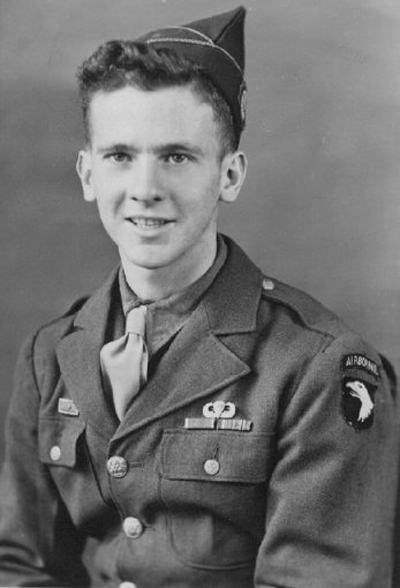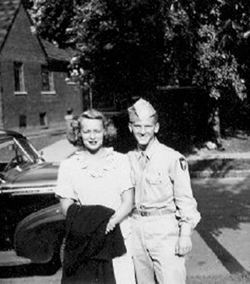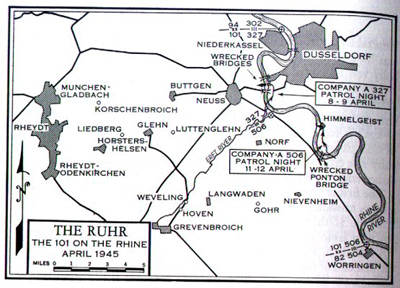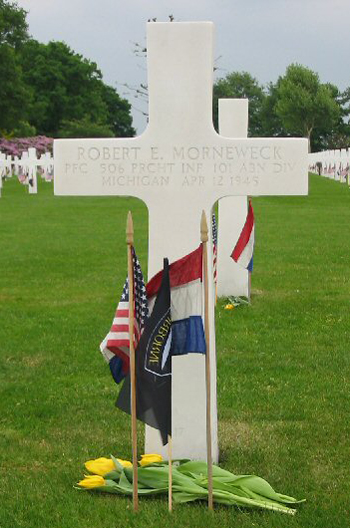Private First Class Robert E. Morneweck November 12, 1925 - April 12, 1945 Detroit, Michigan - Margraten |
Robert E. Morneweck was born on November 12, 1925
in Detroit, Michigan. He had three sisters and two brothers. He went to Northwestern
High School in Detroit and enrolled into the R.O.T.C. program there.
Arthur Morneweck, Robert's older brother by three years, wrote: 'In spring
of 1944 Robert came to see me at Gettysburg College, where I was an Army Air
Corps Cadet. Little did I know this would be the last time I would see him.
Robert was shorter than me (I am 5' 10") but was solidly built. He was in high
school R.O.T.C. and was so proud when he received his paratrooper wings. The
following is from a letter my family received from one of Robert's buddy's
father:

"He (Robert) was smaller than the other parachutists we knew and did not appear to be as sturdy. The last Sunday the boys were all at our house ,he demonstrated, at least, that I was wrong about that. Several of my sons Washington's friends were also at the party. including one boy in the Navy who described one of their setting up Exercises. It starts with a push up from the floor, done with a sufficient snap to throw the body into the air. While up there, the trick is to clap the hands and click the heels together quickly enough to catch yourself before you shove your nose through the carpet. The Navy boy did it once, very badly, but Robert was interested. "That looks like a good trick" he said. So he spread himself out on the floor and did the thing ten times. I think he could have done more but I stopped him, having some idea that the house might fall down if I didn't."

Robert became part of A company, 506th Parachute Infantry
Regiment, 101st Airborne Division.
He was wounded and awarded the Purple Heart, during the defense of Bastogne
in the Battle of the Bulge. When the wounds had healed, Robert went back to
his unit on the frontline.
The action in which Robert was killed is described as follows in Rendezvous
With Destiny(1), the history of the 101st Airborne Division:
At this time, the 101st was stationed on the west side of the Rhine, in the
Ruhr area, just south of Dusseldorf. This was a time of relative quiet for
the division.
"What fighting there was occurred when the patrols from the line regiments slipped across the river at night - the once-thought impregnable Rhine, now vulnerable to any squad with a boat- and bumped into still dangerous defenders.

(...)The other large raid of the campaign was carried
out on the night of April 11-12 by Company A of the 506th. One Hundred twenty-six
members of the company and four of the 321st Artillery Battalion crossed
the Rhine in sixteen assault boats just after midnight and attacked the river-bank
village of Himmelgeist. They ran in to a scattering of small arms fire, killed
two defenders, and entered the town. In Himmelgeist they captured seven civilians
suspected of having taken part in the defense of the place and then withdrew,
getting back to the far shore by 0415. The raid cost the company three killed
and four wounded, mostly from small arms fire, though there was some flat-trajectory
shelling during the withdrawal. Two boats capsized in midstream under enemy
artillery fire and eight men were missing, believed drowned."
Ray Boscom was with Robert when he died. He wrote Robert's family on 30 June
1945, when he was at Berchtesgarden, about what happened :
"The raid Bob lost his life, he was loaded with extra ammunition and grenades.
The raid we pulled across the Rhine. It was below Dusseldorf and about five miles
from Nienenhiem.
It was at that time of the Rhine-pocket, so you see what we were up against.
We started across about midnight to load in the boats, three 88's opened up
and everybody instantly tried to hop into the nearest boat to where they were.
As a result, four boats overturned and we lost 18 men. What few did get out
said that it was impossible to swim in the current. Our boats picked up some
but it was so dark that we couldn't see over 5 feet in front."
Don Burgett, squad leader in A company, wrote:
"I was squad leader of the 2nd squad, 2nd platoon, A Co. at that time, 12 April
1945; the night President Roosevelt died. Alex Abercrombie died along with Syer,
Santillan and Floyd Roberts by German artillery fire; all of whom were buried
by the Germans in a common grave. Their bodies were recovered by a patrol led
by Jack Bram a couple of days later and brought back across the Rhine River in
a rowboat.
Pfc Corgan was in my squad as were two other new replacements. Corgan was seriously wounded in both arms, the medics bandaged him and bound his arms to his body in an attempt to stop the bleeding. Corgan's boat was overturned by a close artillery round as we were returning to the American side of the Rhine from Himmelgeist. Corgan drowned as a result.
I did receive two new replacements the morning of 12 April 1945 but didn't have time to get their names on our roster. Both of them also drowned as a result of overturned boats in heavy artillery fire. I do not know their names and as far as I know, there is no way I can find out now. One of them may have been Robert Morneweck."

Acknowledgements:
Art Morneweck, Robert's older
brother, provided the pictures and information. Art himself is a WWII and
Korea veteran.
Don Burget, Squad leader, A Company and author of several books about his wartime
career with A company, 506 PIR.
Sources:
(1) Redezvous With Destiny, Leonard
Rapport & Arthur Norwood, Konecky & Konecky, Old Saybrook, CT, 2001
Written account by Art Morneweck
Written account by Ray Boscom
Special thanks to Steven Oudshoorn